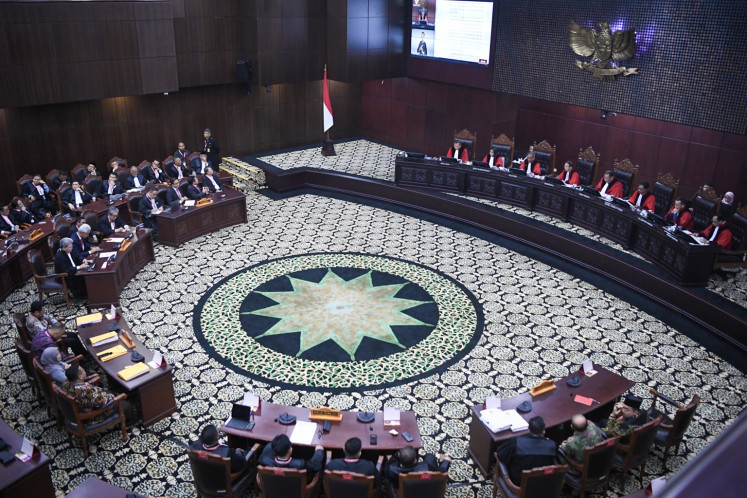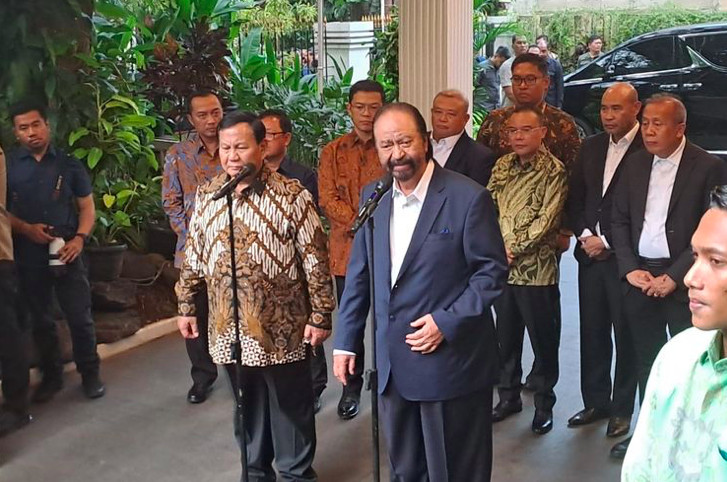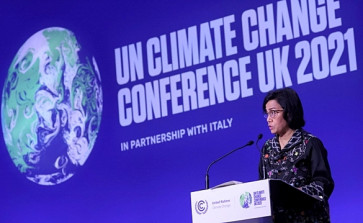Is a just and green recovery affordable for Indonesia?
These new pledges will cost more money. The cost of climate inaction to the global economy, however, is greater still.
Change Size
 Finance Minister Sri Mulyani speaks during the UN Climate Change Conference (COP26) in Glasgow, Scotland, the United Kingdom, on Nov. 3. (Reuters/Yves Herman)
Finance Minister Sri Mulyani speaks during the UN Climate Change Conference (COP26) in Glasgow, Scotland, the United Kingdom, on Nov. 3. (Reuters/Yves Herman)

The United Nations climate change conference (COP26) has just concluded, and already world leaders have come together to make several major pledges. Indonesia proudly joined more than 100 nations agreeing to reach net sink by 2030. We are also part of a coalition of more than 80 countries pledging to cut methane emissions by at least 30 percent by 2030. Notably, we are just one of some 20 countries committed to phasing out coal power.
These new commitments dovetail with our Long-Term Strategy for Low Carbon and Climate Resilience (LTS-LCCR) submission earlier this year. The LTS document outlines Indonesia’s plan to reach peak emissions by 2030 and achieve net-zero emissions (NZE) by 2060 or sooner, making us one of only two countries in Southeast Asia to have done so. This aspiration indicates our commitment to climate action, that despite being battered by COVID-19, we seek to project a confident and proud 2021.
Notwithstanding the above, COP26 negotiations also made clear that major sticking points remain, particularly around financing to support countries of the Global South.
Climate action costs money. These new pledges will cost more money. The cost of climate inaction to the global economy, however, is greater still. In 2019, a World Economic Forum report warned that failure to act on climate change would bring considerable physical and transition risks to the global economy over the next 10 years. Some estimates suggest that the global gross domestic product (GDP) forgone due to climate change could range between 15 percent and 30 percent – far worse than the Great Depression at 15 percent or the Global Financial Crisis at merely 1 percent.
Then, there is also the ongoing global pandemic to consider. As countries continue to prioritize their response to COVID-19 – and reasonably so – the goodwill of countries to work together on other global concerns will remain weak. Already we see how issues like vaccine equity have polarized many. So the question is, is a just and green recovery affordable?
Macroeconomic, fiscal and monetary issues will be key topics of both the Coalition of Finance Ministers of Climate Action and the Group of 20. Indonesia cochairs the Coalition and is about to assume the G20 presidency for the first time. This puts us in a good position to raise such difficult issues. Indeed, many countries, not only those in the Global South, are grappling with how to manage the economic recovery while juggling the ever-growing cost of the pandemic and climate commitments. It is therefore even more vital that the global community works together to “build back better”.
As we see it, there are several key fiscal hurdles to overcome. The first and foremost is the tighter fiscal space countries are currently experiencing due to the COVID-19 pandemic. While Indonesia’s economy managed to maintain a relatively small contraction of 2.07 percent in 2020 with a moderate fiscal deficit of 6.07 percent, the pandemic response continues, and we are in no way out of the woods. The IMF estimates that low-income countries alone would need an estimated US$200 billion from 2021 to 2025 to respond to and recover from the pandemic.


















